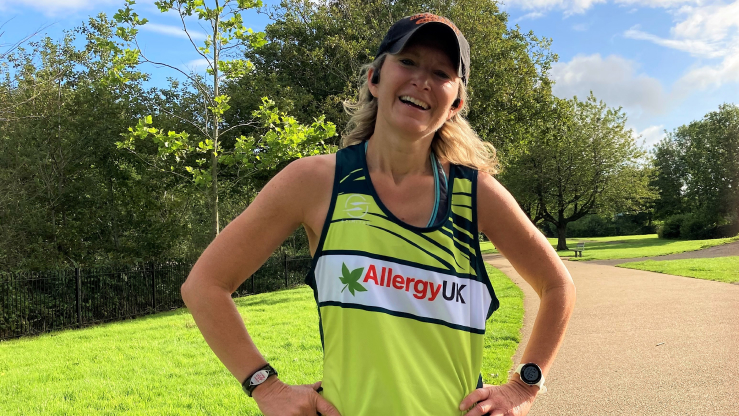Q: My child is starting school, I feel the school is not taking their allergies seriously. What can I do?
Request a meeting with the head teacher to discuss your concerns. The class teacher, SENCO, school nurse and cook (if applicable) may also be involved in further discussions. Ask the school how they deal with pupils who have medical needs such as allergy. They may have a policy and other children in the school with an allergy.
Make sure your child has a detailed management/care plan and discuss this with the school (see below for more info).
Provide the school with some information about the allergy, such as our Factsheets. If it is a specific food such peanuts, then download and take in our peanut allergy Factsheet.
Ask the school head/SENCO to go to the schools section on our Allergy UK website or phone our Helpline for advice. Discuss an in-depth risk assessment if needed. Provide suitable alternatives for the things you are concerned about.
Make sure your child knows to tell the teacher or dinner lady if they feel unwell and talk to your child about not sharing packed lunches/school dinners/any foods and not to take sweets/chocolates/food from anyone.
Q: My child has a nut allergy and our school will not ban nuts, why?
It is not possible to guarantee and enforce a nut free zone as staff cannot monitor all lunches and snacks brought in from home. A free from environment creates a false sense of security and does not safely prepare children for environments where nuts may be present.
Age appropriate education and awareness is important.
The school would need to consider other children with different food allergies and it is not practical to restrict them all. The school should have procedures in place to minimise risk of reaction via cross contamination etc.
Q: My child is allergic to peanuts, another child has threatened to throw some at him and is bullying him. What else can I do?
Ask if the school can arrange a session from the school nurse or a parent to teach the pupils about allergy, allergic reactions and what the potential consequences could be.
If this approach is not possible or does not resolve the issue, then arrange a meeting with the school head teacher/a member of the board of governors/class teacher to discuss the actions to be taken next. The school should emphasise to the child that any behaviour or attempts to harm a child with an allergen they are allergic to is treated as a serious and dangerous incident and managed accordingly. If not resolved, ask for a meeting with the other child’s parents. Contact the education department of your local authority or OFSTED.
Q: My child does Forest School and there are conkers and walnuts in the area and on the floor. Is my child at risk due to their nut allergy?
Conkers are not a nut so do not pose a threat for those that are nut allergic. Minimise contact with walnuts, however the risk is minimal if they remain in their shells. Make sure that any prescribed allergy medications are on hand if required. Make sure your child is able to recognise them and is aware not to touch or eat them.
Q: There is a hazelnut tree in the school grounds, but the school will not remove it. How can I keep my child safe?
The tree itself is of little risk. To prevent the risk of exposure to the nuts, the school can canopy the tree so it does not bear fruit. Make sure your child is able to recognise them and is aware to stay away from the tree if needed.
Q: My child’s school has a dog and my child is allergic to dogs. The school will not remove the dog, is this a risk to my child?
- If your child has any symptoms, make sure they visit the GP to ask for medical advice so that it is recorded. Any medication prescribed or needed for these symptoms should be brought into school and discussed with the head teacher as the school may have to do a risk assessment.
- Avoid direct contact (touching/petting) the dog and request that the dog is kept in restricted areas and not in class rooms, specifically on carpeted floors.
- Make sure your child has their medication available.
- Make sure the school is regularly cleaned more thoroughly in areas where the dog is allowed, using a vacuum cleaner that has been shown to remove cat/dog hair allergens and using a clean damp cloth in other areas, to minimise allergen from dog. Speak to the education department of your local authority if the school is not prepared to make changes to help minimise the risk of exposure and take in some information such as our information actsheet on pet allergy.
Q: My child’s class is hatching chicks and has an egg allergy. How can I keep them?
Make sure your child avoids contact with eggs whilst they are being incubated. Observe but do not touch. Once the eggs are hatched make sure staff dispose of shells and avoid contact. Suggest alternatives such as butterfly or stick insect life cycles and/or take in some information such as our information Factsheet on egg allergy.
Q: My child is allergic to milk, the children have a carton of milk at break time in the classroom and playground. How can I keep them safe?
- Make sure your child is aware not to touch the cartons. Request the class has a milk drinking zone/area in classroom and playground to provide milk free areas.
- Make sure that hands are washed after consuming the milk and all empty cartons are disposed of responsibly. Make sure that any surfaces that have had milk stored on them are cleaned and have a process to make sure spilt milk is cleaned up effectively.
- Discuss with the school a milk free alternative for your child so that they will still have a drink at break time (you may have to bring this in for your child).
Q: The school does not have anyone trained to administer Adrenaline Auto-Injectors (such as Epipen). Do they need to be trained?
If your child has a prescribed Adrenaline Auto-Injector (AAI), then before your child starts, discuss with the school how it will be given and by whom if required. This may be a training issue for the school that they will need to address, because they have a duty of care to make sure that your child can be safely looked after. Many schools now have staff that are able and equipped to assist in the administration of medicine should your child not be in a position to do so themselves. So it is very unusual for no one in a school to be trained in the use of an AAI. If this is the case, then request training as all people administering an AAI should be trained.
- First aid courses that include allergy management are widely available.
- The school nurse or a nurse from the allergy service at the local hospital may be able to train staff.
- Training videos and trainer devices for teaching/demonstration are available on the manufacturer’s websites for the AAI’s.
Q: My child’s school is very large and our AAI’s are kept in the office. Should the pens be moved around with my child?
Make sure that any medications required to help treat an allergic reaction are kept in a central location along with your child’s personalised management plan. For older children it may be appropriate for them to have their allergy medications on them. If it is not possible to get to AAI’s within five minutes, the they may need to be moved to a closer location or AAIs should be kept in two locations for larger schools.
Q: The school caterer has said they cannot give my child a meal free from their allergens. Are they required to do so?
There is no obligation to provide a meal, however effort should be made to do so. Have a meeting with caterer and a representative of the school to discuss suitable alternatives. Offer to help provide or source free from ingredients if you are willing to do so.
Provide a packed lunch if the school cannot guarantee free from meals.
Q: I want someone to sit with my child at lunch time but the school has refused. How can I make sure my child is safe when eating?
- Due to staffing levels this may not always be possible. Request your child sits on the end of a table with children next to and opposite them with safe lunches (friends or maybe lunch buddies) this minimises risk of cross contamination and exposure.
- Make sure your child is aware to only eat his/her own food and not swap or share food. All children should wash their hands before and after eating.
- Request that the school makes sure that the tables are sufficiently cleaned before and after meal times.
Q: The school often has bake sales, how can I make sure my child can be included in these and remain safe?
- Ask if the school can request prebought cakes to be kept in original packaging. Offer to supply a suitable ingredients list for homemade cakes.
- Have a free from cake table or section of the bake sale and provide a selection of safe cakes your child can eat so they can join in. Use the bake sale to help provide allergy awareness.
Q: Parents give out sweets and cakes on birthdays, should this be stopped?
The school can stop this if they wish. Consider the use of non-food related rewards like stickers or pens.
It can be made safe by providing the class teacher with alternatives that your child can eat so these can be swapped over when given out. Make sure your child knows to ask if they can eat it or to swap it for safe alternative.
Q: I have been asked to do an assembly to explain allergies do you have any resources?
We have a number of Factsheets covering multiple allergic conditions on our website allergyuk.org and sparepensinschools.uk has some great information for schools and pupils, all of which can be used for information gathering when planning your assembly.
If you need any further information please contact our Helpline on 01322 619898 or by email at [email protected].

 Helpline
Helpline




